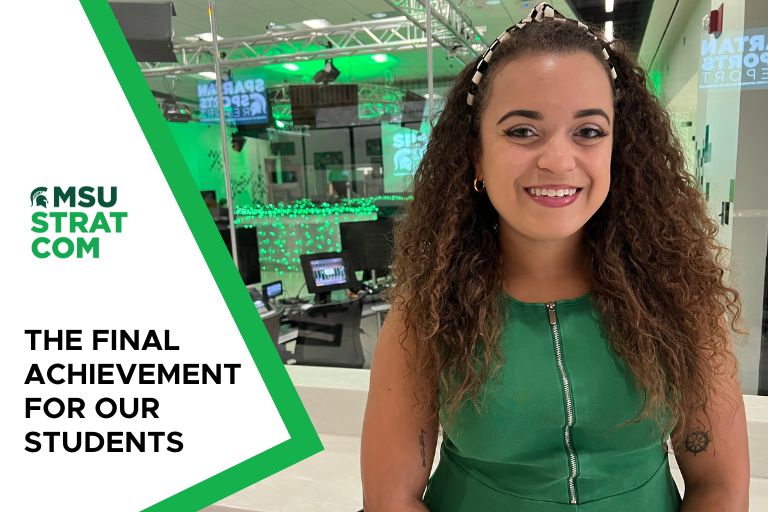At Michigan State University, where tradition and innovation merge seamlessly, the capstone course for the Strategic Communication online master’s program stands as the final achievement for students navigating the landscape of digital communication.
As the program’s concluding course, the capstone experience offers a unique opportunity for students to showcase their strategic competence and creative vision, often culminating in projects that address current communication challenges faced by organizations and brands in an ever-evolving digital world.
“There’s two major parts to the capstone,” said MSU Media and Information professor, Dr. Tom Day. Day is one of two StratCom instructors leading this course.
“The first part has the students working in groups to create a strategic communications plan for a fictitious company. The second part has the students creating a personal portfolio, or digital representation of what they’ve accomplished so far.”
The portfolio can include work from outside of the student's time in the program as well.
While many master’s programs traditionally end in a thesis, the StratCom program takes a more dynamic approach with its project-based capstone course. Embracing a service-learning model, this course challenges students to apply their managerial, communication, and strategic expertise to real-world business projects. Working collaboratively in virtual teams, students tackle complex issues like crisis communications and translating their academic learnings into solutions that resonate in today’s online landscape.
“I was attracted to the StratCom program because of the capstone course before I even started the program,” said 2024 program alumna Dana Whyte. “I thought it was smart that its main goal is to help us land a new job or propel our careers.”
Whyte shares that having created a personal portfolio during the second part of her capstone course is what helped her land a new job as a communication strategist at Byrum and Fisk Advocacy Communications after she graduated.
“For my online portfolio I added my resume, writing samples, references, and just a little bit about me onto a website with a link that I was able to send out to employers,” said Whyte. “And when I was interviewing for my new job, the boss asked me if I could send him writing samples, and I had just finished the capstone, so everything was fresh on my online portfolio already. And eventually it did help me land the job.”
Whyte emphasizes the convenience of having all her materials neatly compiled in one place, which enhanced her interviewing efficiency.
“I think one of the best things you can do when entering the capstone class is to think about how you want to put together your portfolio,” said Day. “Think about what aspects of your career, your life, your journey thus far you want to share with the world.”
“Because the capstone is really a celebration of you as a person, and you getting this far, when students start putting all their successes onto paper. It really builds this beautiful picture of who they are and what they’ve accomplished.”
